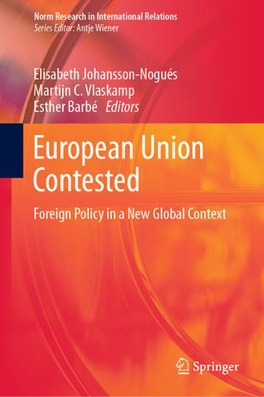Forthcoming book analyses how the EU deals with contestation in a new global context.
In their new edited volume “European Union Contested: Foreign Policy in a New Global Context” (edited by IBEI researchers Elisabeth Johansson-Nogués, Martijn Vlaskamp and Esther Barbé; Springer Nature), the authors discuss how the EU responds to the contestation of some of their core norms. Both at home and abroad, many of the ideas that guide EU foreign policy, are under pressure. The contributors, renowned experts in their respective areas, analyze ten different cases. The book is part of the research project EU-NormCon.
The book's online version can already be purchased on Springer's website. From early 2020 on, the book will also be available in print.
Among the contributors to this edited volume are a number of IBEI faculty members, whose chapters can be found below:
- EU Foreign Policy and Norm Contestation in an Eroding Western and Intra-EU Liberal Order. By Elisabeth Johansson-Nogués, Associate Professor at IBEI; Martijn Vlaskamp, Beatriu de Pinós fellow at IBEI; and Esther Barbé, Senior Research Associate at IBEI.
- The EU and Controlling the Use of the Death Penalty: An Organising Principle for Which Fundamental Norm? By Robert Kissack, Associate Professor & Head of Studies at IBEI.
- India's 'Silent Contestation' of the EU’s Perspective on Local Ownership. By Lara Klossek, Predoctoral Fellow, Marie S. Curie European Training Network, H2020 at IBEI.
- Good Natural Resource Governance: How Does the EU Deal with the Contestation of Transparency Standards? By Martijn Vlaskamp, Beatriu de Pinós fellow at IBEI.
- The European Union and Lethal Autonomous Weapons Systems: United in Diversity? By Esther Barbé, Senior Research Associate at IBEI; & Diego Badell, Predoctoral Fellow FPI at IBEI.
- Military Capacity Building as EU’s New Security and Development Strategy: The New Rules for Peace Promotion? By Marta Iñiguez de Heredia, Affiliated faculty at IBEI.
ABOUT THIS BOOK
The European Union's foreign policy and its international role are increasingly being contested both globally and at home. At the global level, a growing number of states are now challenging the Western-led liberal order defended by the EU. Large as well as smaller states are vying for more leeway to act out their own communitarian principles on and approaches to sovereignty, security and economic development. At the European level, a similar battle has begun over principles, values and institutions. The most vocal critics have been anti-globalization movements, developmental NGOs, and populist political parties at both extremes of the left-right political spectrum.
This book, based on ten case studies, explores some of the most important current challenges to EU foreign policy norms, whether at the global, glocal or intra-EU level. The case studies cover contestation of the EU's fundamental norms, organizing principles and standardized procedures in relation to the abolition of the death penalty, climate, Responsibility to Protect, peacebuilding, natural resource governance, the International Criminal Court, lethal autonomous weapons systems, trade, the security-development nexus and the use of consensus on foreign policy matters in the European Parliament. The book also theorizes the current norm contestation in terms of the extent to, and conditions under which, the EU foreign policy is being put to the test. More information

